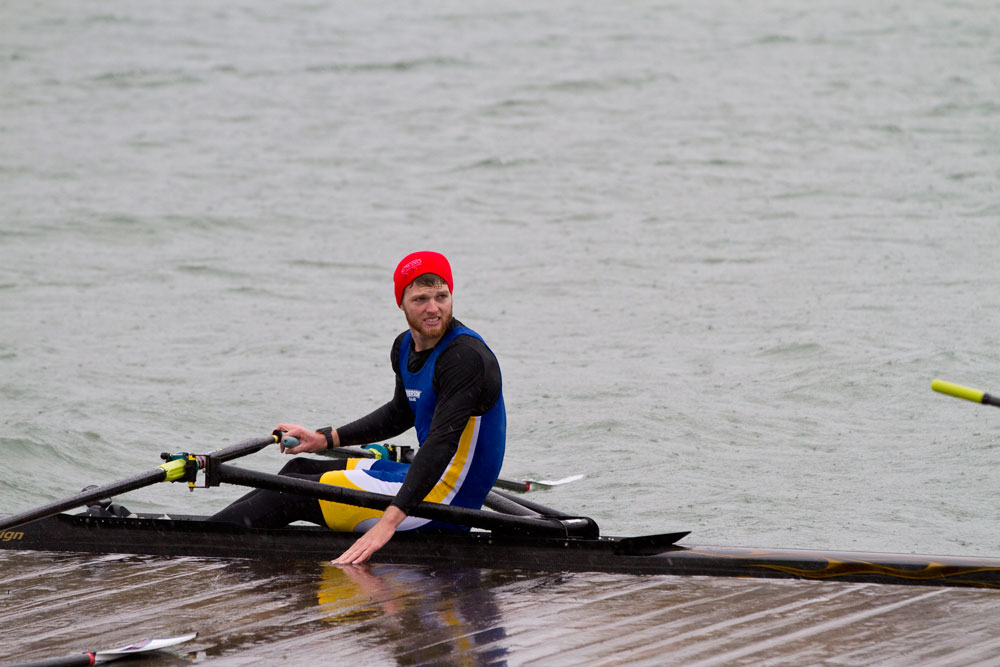Last weekend, Ben Murphy competed at the OUA Rowing Championships in St. Catharines. Extreme weather made it difficult for Murphy, as he failed to qualify for the finals. The fourth-year architectural science student spoke to Photo Editor Marissa Dederer about life as Ryerson’s lone rower.
What’s it like to be the only rower on Ryerson’s team?
It’s different from what most people think it would be because I still have a strong group over at the Argonaut Rowing Club. They’re my team even though they’re not from Ryerson. So I’ve still got a team atmosphere.
What’s the training like in rowing?
The training is a lot of aerobic (longer distance, working up cardiovascular levels) as well as a bit of anaerobic (shorter and more sprint-like workouts) work — probably eight to 10 workouts a week.
Are these workouts in the boat or in the gym?
I try to get as much time on the water as possible, but if say the wind is picking up or I don’t have time to go down to the boathouse, the erg is a good substitute, the erg being the indoor rowing machine.
What about those early mornings?
Oh, those early mornings. They can get a bit unfavourable at times, but I’m used to them. I get up and I realize, “hey, I’ve done this many times before.” During the summer it wasn’t anything before 6 a.m. because the workouts would be at 7 a.m., but because of school I’ve had to move the practices to earlier times as well. [But] because of the fall season — basically the solar cycle — it gets darker and darker throughout the year. So we’ve gone from having it be bright out at 7 a.m. to still needing lights on the boat.
How much would you say you eat on a typical day?
I eat just about as much as I can. But in terms of calories it’s probably around 4,000, 5,000 or 6,000 calories. I need just a basic amount to maintain my daily function and then there’s also the workouts which take a lot of calories.
Rowing has the reputation of being an upper-class sport. Is that fair?
I can see how it can be displayed as an upper-class sport. It has to have the right conditions for a rowing program to succeed. There’s a lot of capital that goes into it (purchasing boats and having facilities to maintain them), but [the sport] tries not to discriminate who goes into it. But it is still a very traditional sport in the way that if your parents are rowers, [their] children are probably going to be rowers as well. It hasn’t expanded to outside of just the basic rowing community to where it can be seen on TV like the NHL, or football or basketball where anybody can play anywhere.
What would you do if you didn’t row, sports-wise?
I’d probably still be doing cross-country and running track, most likely recreational hockey and soccer, maybe a bit of basketball, but mostly running.
What’s the difference between rowing and kayaking?
Rowing is very much different from kayaking much like it’s very different from canoeing and rafting. In rowing the oars are locked into sort of a handle so that you can’t move the oars out of the handles but you can move them in a pivot. [In] kayaking the oar or paddle is completely within your own hands and is free to move. As well, in rowing you don’t see where you’re going you’re actually looking backwards. Whereas kayaking you’re still looking forwards and it’s a lot more upper body and hips than rowing [which] is mostly legs and core.
You had great results last summer at the Royal Canadian Henley. Tell us about that.
I believe it was the 130th Royal Canadian Henley — which is the Canadian version of the Henley Royal Regatta, which is based over in England. But it’s a really good event. It’s equivalent to nationals, or almost worlds for North America, South America and some other countries that come over to Canada — St. Catharines being where Henley is. It was a lot of fun. I actually got second place in my event, being the top Canadian. The person who won gold in my event was this very strong competitor from Argentina. But it was a good time; you meet a lot of different rowers and get to see a lot of different races.
What will you do once you finish school in the spring?
When I finish school in the spring, I’m planning on going to the under-23 national team’s training camp to prepare us for under-23 worlds which will be happening in July over in [Lithuania]. After that, I’ll probably compete at Henley and then I’ve got a few options as to what I’ll be doing from there and those options are dependent on how well I perform in the next few weeks. I could be pursuing another undergrad or I could go solely into rowing. If rowing doesn’t really pan out I guess I’ll be looking for a job.












Leave a Reply